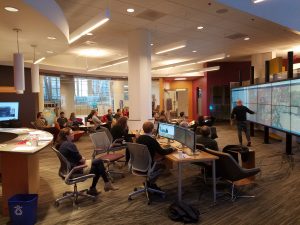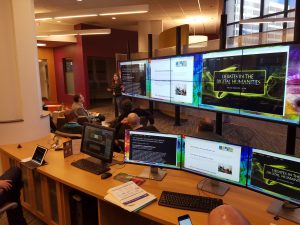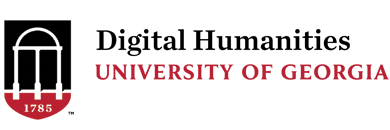Georgia Digital Humanities Summit meeting

The first Georgia Digital Humanities Summit took place on December 9, at Georgia State’s CURVE data visualization lab. The summit, sponsored by the University of Georgia with support from a Mellon Foundation New Director’s Grant, and hosted by Georgia State, brought together 35 hand-selected participants from 10 colleges and universities around the state, from Georgia Tech to Georgia Southern. The participants represented an array of skills and specialties and ranged in rank and position to include librarians, instructional technologists, research faculty and digital humanities practitioners. This summit meeting was the first in what we hope is a continued and sustained dialogue that will keep us connected with the broad range of DH work already happening in the state.

This connection will make all of our endeavors stronger. With further communication we can more easily identify common needs like those found in the Council on Library and Information Resources Hidden Collections collaborative grant, co-authored by the Digital Library of Georgia, Spelman College Archives and Morehouse College. Their project “Our Story: Digitizing Publications and Photographs of the Historically Black Atlanta University Center Institutions,” was awarded funding to increase accessibility and interoperability of materials currently held in the Atlanta University Center Woodruff Library. Connecting these materials through the DLG will make the history of African American higher education more discoverable and accessible for future scholars and our entire community can benefit from these collaborative projects that leverage the combined skills and expertise of each institution.
From this meeting, the group has created Georgia DH a site that includes a list of practitioners, skill sets, and locally focused projects. Our goal is to open opportunities for inter-institutional collaboration on both research projects and classroom endeavors that can draw on the collective skills of the group. Georgia State’s ATLMaps project, one that layers historic maps of the city and allows researchers to create collections, pin locations, and investigate the spatial history of the city, is an example of how such a collaboration can work in a regional context using a broad base to which innumerable projects can be attached. Several institutions have provided historic maps to the collection and a number of projects are already underway using these materials. We aim to identify other platforms and topics that can be simultaneously investigated from multiple perspectives.
If you would like to participate in the consortium, visit Georgia DH and add your information to our directory. For more information, please contact Emily McGinn UGA’s Digital Humanities Coordinator at digi at uga dot edu or Spencer Roberts, the Digital Scholarship Librarian at Georgia State at sroberts63 at gsu dot edu.
